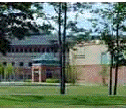





















|

|
| Particle Adhesion | |
| Van der Waals Force | JKR and Other Adhesion Models | Particle Adhesion & Removal | Effects of Charge | Effect of Humidity | Ultrasonic and Megasonic Cleaning | |


|
|
JKR and Other Adhesion Models DMT Model Derjaguin-Muller-Toporov (1975) assumed that the Hertz deformation and developed another model that included the effect of adhesion force. According to the DMT model, the pull-off force is given as
Contact Radius at Zero Force The contact radius at zero external force is given as
Contact Radius at Separation The DMT model predicts that the contact radius at the separation is zero. That is
|


|
 ,
(
,
(  )
) (Hertz contact radius under adhesion force)
(Hertz contact radius under adhesion force)